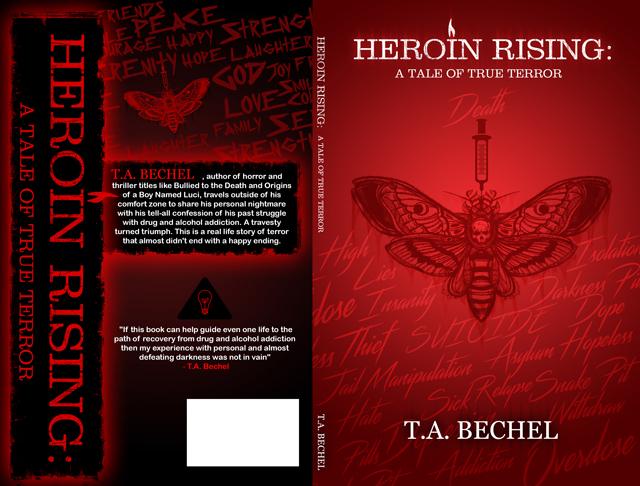
ALTON - Emotions run high when someone dies young. When they die from an apparent drug overdose, leaving behind a child and family who loves them, that grief can easily turn into blame.
Get The Latest News!
Don't miss our top stories and need-to-know news everyday in your inbox.
Those exact conditions have led to a recent social media campaign called "Kill Your Local Heroin Dealer," following the death of a young woman in the Riverbend. Madison County Coroner Steve Nonn said her death has not been officially ruled as a drug overdose - citing toxicology reports have yet to be released, but he did say it is currently being investigated as one. Her Facebook page is also rife with people casting blame on drugs for her untimely demise. Whether or not heroin, or any drugs at all, played a role in her untimely passing, it has brought new light to the heroin epidemic in Madison County - a force which can be used constructively or destructively - local author and recovering heroin addict Ty Bechel said.
"I don't like that term, even metaphorically," Bechel said of "Kill Your Local Heroin Dealer." "Aggression comes with that term, and I believe aggression is not the answer to this. Open and quality based conversations with the community are part of that answer."
Bechel penned an autobiography regarding his descent and struggle with addiction called "Heroin Rising," as well as a fictional play called "If I Never Wake Up." "Heroin Rising" can be found at several local bookstores and can be ordered online. He also started a non-profit group called Amare (which translates as an Italian verb for loving, or to love). Through Amare, Bechel said he wants the community to come together with recovering addicts to show them they are still welcome to contribute.

During his many attempts at recovery, Bechel finally found a reason to quit through volunteering. As he helped the world in a way, which was tangible for him, he saw a reason to move past his addictions.
"Aggression is not going to work," he said. "We need to get involved together, volunteer together, and show we stand together as a community strong and together. The addict and the dealer have diseases. The dealer is addicted to the lifestyle. Aggression is not creating positivity. I understand people are upset, and they should be, but being aware of our emotions is what we need right now. It's a problem, it's been a problem for a while, and it's not getting any better. There is a moment when we draw a line and ask if we really do care about our community."
To prove that care, Bechel said he works toward building bridges between recovering addicts, current addicts, law enforcement and members of the community. He said he wants to invite people to build community together in whatever capacity they can. He said it can be as simple as dining with each other and sharing experiences. He said people can also get together and work on the community. Currently, he said he is helping create a breakfast served to recovering addicts by members of law enforcement and first responders.
He is doing this through Amare's Community Recovering Wellness Initiative, which he said will be a four-point plan to get together with addicts and the community to assist in different capacities. He said resources and a lack of money are not the biggest problems facing Madison County when it comes to the heroin epidemic. Instead, he blames lack of interest in helping.
"We don't have a money problem, we have a participation problem," Bechel said. "In the book 'The Heart of Change,' which is written for organizations - and Madison County is an organization - there are eight stages of change. First - we need urgency, second - we build a guiding team. I would like to work through this together. If we build better neighborhoods, we can start saying, 'Hey, we don't want this in my neighborhood, please leave.'"
As a father of now four children, Bechel said he is able to look at the heroin epidemic from the perspective of both a recovering addict and a father. He said his oldest daughter, who is 11, is at an age at which drugs may be offered to her.
"A strong community wants to get better," Bechel said. "Our county and our nation are sick. How do we recover? One - we must admit we have a problem, just like an addict does. Then, we have to take steps toward community outreach and creating new jobs. Look at the census numbers in 2010, we've lost thousands of people in Alton. We've lost people, we've lost jobs, and our roads are kind of breaking up. I see more and more people walking around. It's everywhere - if only we could get together and talk about it."
Talking about it is exactly what Bechel does. He has worked with both Nonn and Madison County State's Attorney Tom Gibbons to help build bridges between law enforcement and recovering addicts. In a previous interview with Riverbender.com, Gibbons said the county has been treating the heroin epidemic as a public health issue more than a criminal issue - saying enforcement is only one third of the process, and adding "you cannot arrest your way out of the heroin epidemic. It's just not possible."
While Bechel is preaching compassion and community, he also says he feels as if people are "under attack" from the heroin epidemic. Like Gibbons, Bechel said the current drug wars in Mexico between cartels are causing havoc as far away as Madison County.
"Down in Mexico, it is going crazy," he said. "With the heroin and now the Fentanyl coming, I feel we are under attack. Just when we kind of maybe have a handle on it, it comes back full force."
According to the drug overdose deaths of 2016, Fentanyl has replaced heroin as the number one killer of drug users in Madison County. Nonn said that number should not be good news the heroin epidemic is waning, however.
"Heroin deaths are going down," Nonn said. "It went down, but but Fentanyl is going up. In a number of those cases, people thought they were taking heroin. Fentanyl is 50 times more dangerous than heroin. People are selling Fentanyl and saying it's heroin, so while heroin deaths may have decreased, those people may have thought they were still taking heroin. If you add that to the 14 heroin deaths in 2016, we did have, that's 34."
Those numbers do not accurately represent the full extent of the heroin epidemic in Madison County, however. Nonn said his office is only called when someone does not recover. Alton Police Chief Jason "Jake" Simmons said his officers and members of the Alton Fire Department as well as both Alton Memorial and Lifestar ambulance services have seen people struggle to recover, even after administering NARCAN - once touted as a "miracle drug" - which could instantly revive people dying of an overdose, almost immediately.
"NARCAN has saved a lot of lives," Simmons said. "Staff has told me the heroin around here has become so stringent with other chemicals in it, it sometimes takes two or three shots to bring them up. It used to take just one. A lot of it is Fentanyl, but other chemicals are in it as well."
According to the "Heart of Change" book referenced by Bechel, the third step toward change is creating a vision together - something Gibbons, Simmons and Nonn are doing as well. Gibbons said he has been meeting with several invested parties to create the Partnership for Drug Free Communities, which will soon have a website debut with plenty of resources gathered from groups such as Bechel's Amare as well as local healthcare facilities.
Although this all seems like good news and proactive measures, Bechel said the most important aspect of change must come from within oneself. That change is crucial before any other change can be made. If the heroin epidemic can be quelled, addicts must decide they can change, dealers must decide to find alternative sources of revenue, law enforcement must start seeing addicts as people with diseases instead of criminals, and the community at large must change the way they view addiction. People with that disease are not simply junkies - they are human beings fighting a chemical dependency.
More like this:

